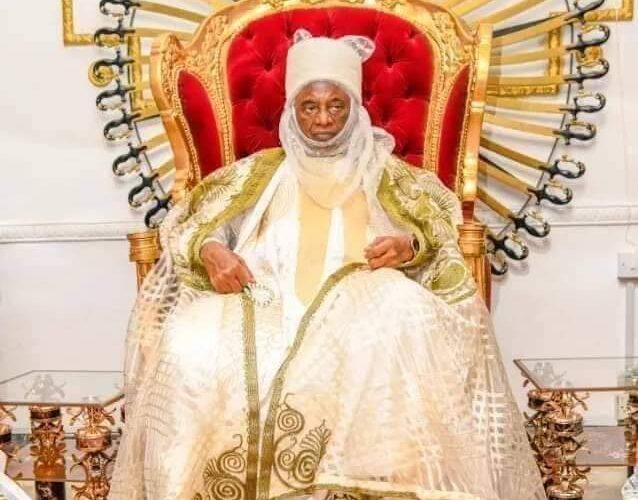Before examining the above mentioned question, I think it is important we all bear in mind that from available historical records, including oral tradition, Ebiraland is a republican society harbouring no room for monarchical dynasty. Furthermore, the promulgation of Edict No. 3 of 6th May, 1997, by Colonel Bzigu Lassa Afakirya (rtd), then Military Administrator (1996-1998), of Kogi State, which also came into force on the 6th May, 1997, laid down the procedures for ascension to the throne of Ohinoyi of Ebiraland. With the Edict, there is no doubting the fact that it (Edict) has finally and fully resolved the controversy in favour of “rotation and not hereditary system.’’ According to Habibu Angulu Sani (1997), the Edict in question has ‘nailed the coffin and thus put to rest the hereditary school of thought for succession to the Ohinoyi of Ebira Paramount Stool.’
Drawing from the above, it is important to state that the Edict of 6th May, 1997 under reference has not only strengthened our resolve not to depart from the age-long practices of rotational order as bequeathed to us by our FATHER – Adai Itaazi Attanuje, but also that government keyed into it, and further legitimized the rotational order via the instrumentality of Ebira Chieftaincy Edict No. 3 of 6th May, 1997.
In answering the question as to who will succeed Ado Ibrahim, the immediate past paramount Ohinoyi of Ebiraland, following his death, it is important that we take a look into the political system in Ebiraland before the coming of the colonial masters in the early 1900s. The British colonial masters entered into Ebiraland in 1903 and discovered that the society was ‘stateless’ or ‘segmented’, meaning that a society that was not under a centralized authority. And they also discovered that the component units of Ebiraland – Okengwe, Adavi, Ihima, Eika and Eganyi, all districts, were ruled independently by ‘clan heads’ or ‘chiefs’, with each area having its paraphernalia of government.
The diffused or divided traditional authority was, however, reorganized and streamlined by the British colonial masters in 1917, thus resulting in the appointment of Ibrahim Chogudo Onoruoiza as the pioneer paramount ruler of Ebiraland, a development which altered the existing political arrangements, in addition to the conferment on Ebiraland the ‘state’ status. The change in the political system was not without opposition, resistance, violence in Eika, Ihima, etc.
Prior to 1917, according to Habibu Angulu Sani, (1997), Atta Omadivi was foisted as District Head on Okene by the colonial masters in 1904. It will be recalled that in spite of the elevation, Atta Omadivi never exercised suzerainty over the districts – Okengwe, Adavi, Ihima, Eika and Eganyi. In other words, the sphere of influence of Atta Omadivi was limited to Okene only and nothing more. He died in January 1917 after thirteen years in the position. In his place, Ohindasi Arudi Adano was appointed District Head, Okene, in January 1917. He died in November 1917.
As earlier stated, Ibrahim Chugudo Onoruoiza was installed as the first paramount ruler of Ebiraland in November 1917 by the colonial masters. He was forced to abdicate the throne in 1954, and died on 13th May, 1964. His remains were interred in his palace in Okene. On 6th June, 1956, Muhammadu Sani Omolori was appointed the Ohinoyi of Ebiraland following the demise of Atta Ibrahim. He was the second paramount ruler of Ebiraland. He was presented a Staff of Office as the First Class ruler by Colonel David Lasisi Bamigboye, then Military Governor of Kwara State in 1974. He died on the 10th July, 1996, having spent over forty years on the throne. In his place, Ado Abdulraman Ibrahim was appointed the third paramount ruler of Ebiraland on the 2nd June, 1997. He died on the 29th October, 2023.
Dissatisfied with the ascension, other contestants (M. J. Ohida, Ahmodu Anivasa, Isa Sani Omolori, Idris Seriki, Nwaha Momoh Sani), for the position of Ohinoyi, led by Maigida U. Lawal of Ihima District, took Ado Ibrahim to the Kogi State High Court, Ayingba, on 6th March, 1998, where the plaintiffs secured a judgment in their favour on 3rd April, 2006. As a result, Ado Ibrahim proceeded to the Court of Appeal, Jos Division, where he lost in a judgment delivered on 12th January, 2009. Finally, he appealed to the Supreme Court of Nigeria, where he had an upper hand in a landmark judgment delivered by the Justices on Friday, 5th June, 2015, thus surviving the judicial fireworks or hurricane that lasted for eighteen years. (1997-2015). He was in this position till he died on the 29th October, 2023.
Given the sequence or chronology of succession to the throne of Ohinoyi of Ebiraland, which started with Ibrahim Chogudo Onoruoiza, from Adavi District, followed by Muhammadu Sani Omolori, from Okengwe District, and thirdly, Ado Ibrahim from Adavi District, has unequivocally shown that monarchical dynasty has no place in the cultural practices in Ebiraland, adding that ascension to the stool of paramount Ohinoyi from time immemorial has always been anchored on rotational order as demonstrated above. It should be further emphasized that given the traditional setting no clan, district, family, previous holders of the throne, etc., should have any illusion whatsoever in arrogating to himself the power to monopolize the stool, but rather the stool should be seen as a common patrimony to be freely accessed by all eligible and interested sons of Ebiraland without any encumbrances. After all, all sons are ‘royal blooded.’
Another perspective that could help provide an answer to the question is to examine the Chieftaincy Edict No. 3 of 6th May, 1997 in order to put us in a position to appreciate its import with regards to who should aspire to the position of Ohinoyi of Ebiraland, and in particular who will succeed Ado Ibrahim, as well as to understand its contents, procedures, and processes for the ascension to the stool of paramount Ohinoyi. To help achieve the objective, I have reproduced hereunder the Edict of 1997 with a view to enabling us understand the Edict, and take an informed decision on the chieftaincy matter.
EDICT OF 1997
KOGI STATE GOVERNMENT OF NIGERIA PROCEDURE FOR ASCENSION TO THE THRONE OF OHINOYI OF EBIRALAND EDICT 1997
EDICT NO. 3 OF 19971
The Military Administrator of Kogi State of Nigeria Col. B. L. Afakirya hereby make the following Edict.
This Edict shall be known as procedure for ascension to the throne of Ohinoyi of Ebiraland Edict No. 3 of 1997 and shall be deemed to have come into force on the 6th day of May 1997.
The stool of the paramount Ruler of Ebiraland who shall be known as Ohinoyi is hereby established.
3a. Ascension to the throne of Ohinoyi of Ebiraland whenever it is vacant shall be by rotation among the Five (5) traditional district in Ebiraland.
b. For avoidance of doubt the five (5) traditional districts in Ebiraland are, Adavi, Okengwe, Ihima, Eika and Eganyi.
c. All eligible and interested sons of Ebiraland are free to contest for the stool of Ohinoyi of Ebiraland under this arrangement provided that, any District that has taken its turn in this rotational order shall not take part until it comes to its turn.
4. Ebira Area Traditional Council shall remain the Council of King makers.
5. The functions of the council of King makers shall be as follows:
a. To announce the passing away of an incumbent after consultation with the family of that Ohinoyi and the Kogi State Government, such announcements must conform with the existing and recognized tradition of Ebira people.
b. To meet immediately upon the vacancy of the throne of Ohinoyi of Ebiraland and elect an acting Chairman of the Council as regent until the new Ohinoyi is appointed.
c. To set in motion machinery for appointment of a new Ohinoyi immediately the stool becomes vacant.
d. To receive applications from eligible and interested sons of Ebiraland for consideration.
6. During the period of selection of a new Ohinoyi:
a. there shall be no masquerade outings or public procession
b. there shall be no open campaign for or against any interested candidate.
c. any person who contravenes section 6a and 6b above is guilty of an offence and shall be liable to imprisonment for five years without any option of fine.
7. No appointment of any Ohinoyi of Ebiraland shall be valid until the Chief Executive of the State has approved such appointment.
8. No provisions of any law of the State that is in force shall invalidate the provisions of this Edict.
MADE at Lokoja this 6th day of May 1997.
COL. B. L. AFAKIRYA
MILITARY ADMINSTRATOR OF
KOGI STATE OF NIGERIA
The Edict of 1997 has eight sections in all. It is a beautiful piece of legislation carefully packaged by the government to assuage the feelings and emotions of Ebira. Of all the sections, it would seem that Section 3, no doubt, is the heart and soul of the law going by the fundamental issues it raised that touch, reinforce and strengthen the very roots of our cultural history and identity as a people. The issues are: first, rotation and not hereditary should be the basis of appointment to the throne of Ohinoyi of Ebiraland. Second, has to do with the delineation and recognition of five (5) traditional districts (Okengwe, Adavi, Ihima, Eika and Eganyi), among which the stool of paramount Ohinoyi of Ebiraland should rotate. Thirdly, it relates to the conferment of rights and privileges on all sons who are eligible and interested to contest for the stool of paramount Ohinoyi, provided it is their turn to produce Ohinoyi of Ebiraland. Fourth, that the stool of paramount Ohinoyi of Ebiraland is not a personal property or fiefdom of any clan, family, or district. Given this, therefore, it is clear that the stool of paramount Ohinoyi is opened to all eligible and interested sons of Ebiraland provided it is their turn to produce Ohinoyi without discrimination whatsoever.
Beginning from 1917, it is an undisputed fact that the stool of paramount Ohinoyi of Ebiraland has been dominated by two districts, that is, Adavi and Okengwe respectively for over one hundred and three (103) years. It is on record, Atta Ibrahim Chogudo Onoruoiza (1917 – 1954) and Ado Abdulraman Ibrahim (1997 – 2023), both from Adavi District, had at different times ruled over the affairs of Ebiraland. Whereas Atta Ibrahim was in the saddle for about thirty-seven (37) years, Ado Ibrahim spent twenty-six (26) years on the throne of Ohinoyi of Ebiraland, thus bringing to a total period of sixty-three (63) years of kingship for both of them. On the other hand, Muhammadu Sani Omolori reigned as Ohinoyi of Ebiraland for over forty (40) years (1956 – 1996). He was from Okengwe District. This means that Adavi and Okengwe Districts have had access to the throne of Ohinoyi of Ebiraland for over one hundred and three years.
The implication of this is that Ihima, Eika, and Eganyi Districts, though recognized by the Edict of 1997 have never had a taste of the common patrimony, that is, the stool of paramount Ohinoyi. It is for this obvious and compelling reason that I would want to advocate that as efforts are being made to appoint a new Ohinoyi, a look-in should be directed to any of the remaining three districts – Ihima, Eika and Eganyi, as a way of creating an environment of conviviality before and after the selection process, as well as to promote a sense of belonging, fairness, equity, justice for them. After all, all sons of the districts are Ebira, and by extension, descendants of Adai Itaazi Attanuje, the ‘Ada’ (Father) and ‘Ohinoyi’ (Leader) of Ebira Opete Chiefdom, the precursor of modern Ebiraland.
Having examined the question – who will succeed Ado Ibrahim with a verdict on rotation with all sense of neutrality and objectivity, another issue that is worthy of consideration is the nature of personality that will be entrusted with power and authority to steer the affairs of Ebiraland. Although, the Edict was silent on the qualities of would-be Ohinoyi, it is important that a set of criteria or qualities is formulated as a basis for the appointment of Ohinoyi of Ebiraland. In this regard, therefore, Dr. Habibu Angulu Sani (2003), in his book titled ‘Rise and Fall of A State Governor in Nigeria: A Case Study of the Use of Power by Abubakar Audu,’ came up with some qualities which in his opinion should form the basis for public office selection. These are: good educational qualifications commensurate with the level of public office sought; sound experience with credible records of service; membership of professional bodies in appropriate discipline; good communication skills and computer literacy; sound knowledge of public affairs; and charisma, physical stability and good health. While agreeing with him on the set of qualities put forward, it is my wish that the Council of Kingmakers may consider additional attributes such as integrity, honesty, stable character, transparency, loyalty, including the capacity to refrain from acts capable of diminishing the integrity of the chieftaincy institution. Furthermore, the Council of Kingmakers should de-emphasize nebulous issues such as wealth as part of the criteria/qualities for the appointment of Ohinoyi of Ebiraland.
The issue of succession to the stool of paramount Ohinoyi is a serious one which should not be handled with levity, and it is for this reason that an appeal goes to the Ebira Traditional Council to be guided by the letter and spirit of the Edict of 1997 in the appointment of Ohinoyi. It is also important that the Council of Kingmakers embrace transparency, uprightness, as watchwords, including avoiding extraneous influence in the appointment of Ohinoyi of Ebiraland so that at the end of the day whoever emerges through transparent process will be assured of the loyalty and support of Ebira in the advancement of Ebiraland in all ramifications.
In concluding this piece, it is important to recall the efforts made by Adai Itaazi Attaanuje in the institutionalization of rotational order as an inherent part of the political system prior to the coming of the colonial masters into Ebiraland in the early 1900s. From all indications, the system was introduced ostensibly to ensure unfettered freedom, autonomy among his sons in the administration of their respective domains. The political system was, however, altered and replaced it with a centralized authority, beginning from 1917, with Atta Ibrahim appointed by the colonial masters to pioneer the system. It is important to state that the centralized authority has come a long way and therefore no attempt should be made to contemplate rejiging the system in favour of monarchical dynasty, egocentricity as it would certainly amount to self-delusion and idiocy.
The Edict No. 3 of 6th May, 1997, represents a watershed in the history of Ebiraland, in the sense that it recognizes the five districts – Adavi, Okengwe, Ihima, Eika and Eganyi as having both the traditional and statutory rights to produce Ohinoyi of Ebiraland on rotational basis. With Adavi and Okengwe Districts having had their turn it should be the turn of any of the remaining districts (Ihima, Eika and Eganyi) this time around to produce Ohinoyi of Ebiraland without let or hindrance. It is important to admonish that any attempt by a select or privileged few to want to monopolize the stool of Ohinoyi could be a catalyst to precipitating anger, tension and disillusionment in the land. In this respect, it is my view that all hands should be on deck to prevent untoward act(s) that could lead to the disintegration of the polity. God forbid!
Before ending this piece, I wish to express my deepest shock and sadness over the passing of our foremost Ohinoyi of Ebiraland, Ado Ibrahim. While in the saddle, he did a lot for the advancement of Ebiraland, particularly as a distinguished promoter of Ebira cultural history and identity. It is my fervent prayers that may God Almighty grant his soul eternal rest and comfort his family.
ISIAKU A. R. AHUTU (MPA)
RETIRED ASSISTANT GENERAL MANAGER
NIGERIAN NATIONAL SHIPPING LINE (DEFUNCT)
TEL: 0803 242 4156
DATE: 22/12/2023



